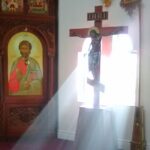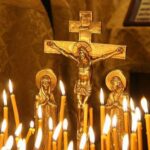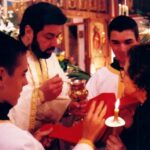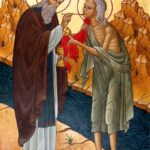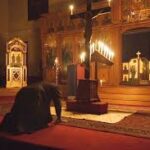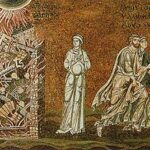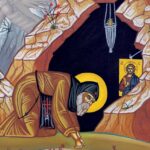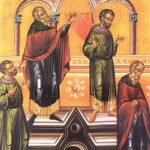by Fr. Jonathan H. Cholcher The term spirituality is not a traditional Orthodox term, although it is a popular term in religious and Christian thought today. Orthodox Christian terminology tends to be concrete and specific, whereas the term spirituality is abstract, meaning something like “generic qualities of the spirit” which can be perceived or applied in any context. For instance, we hear the common phrase: "I'm spiritual, not religious," together with various qualifiers like Eastern vs. Western Spirituality, or Indian Spirituality, … [Read more...]
The Process of Salvation
by Fr. Jonathan H. Cholcher The Orthodox Faith teaches that salvation is a process, that is, a continuous operation, or activity, advancing toward a certain end. The end of the process is unbroken communion with God the Holy Trinity in the uncreated and eternal Kingdom of God. The beginning of the process is our restoration to the divine life in Jesus Christ the Savior in faith, hope, and love. The middle of the process is the gradual and ever-increasing separation from what is contrary to God (i.e., sins, evil passions, and death) and … [Read more...]
Orthodox Memorial Services
by Fr. Jonathan H. Cholcher Orthodox memorial services include all the services of the Church appointed for a person who has departed this life, that is, whose soul has departed from their body in the hope of the resurrection and eternal life. These services begin before the departure of the soul from the body, and they continue well after the departure of a person’s soul from their body, expressed as the Church’s ongoing prayers for the departed (“prayers for the dead”). As with all things Orthodox, the actual theology of dying, death, … [Read more...]
PASCHA and the Eleventh Hour
by Fr. Jonathan H. Cholcher “If any have tarried even until the eleventh hour, let him, also, be not alarmed at his tardiness; for the Lord, who is jealous of His honor, will accept the last even as the first; He giveth rest unto him who cometh at the eleventh hour, even as unto him who hath wrought from the first hour…Wherefore, enter ye all into the joy of your Lord; and receive your reward, both the first, and likewise the second. You rich and poor together, hold high festival. You sober and you heedless, honor the day. Rejoice today, … [Read more...]
The Story of Saint Mary of Egypt: Our Personal Salvation
by Fr. Jonathan H. Cholcher “May God who works amazing miracles and generously bestows gifts on those who turn to Him with faith, reward those who seek light for themselves in this story, who hear, read, and are zealous to write it, and may He grant them the lot of blessed Mary together with all who at different times have pleased God by their pious thoughts and labors.” (St. Sophronius of Jerusalem, The Life of Our Holy Mother Mary of Egypt, epilogue) Here near the end of the season of Great Lent we have the story of Saint Mary of Egypt, … [Read more...]
SPIRITUAL TEACHING IN THE PRAYER OF ST. EPHRAIM
by Fr. Jonathan H. Cholcher The Prayer of St. Ephraim the Syrian (said during weekdays of Lent; translation mine): O Lord and Master of my life, do not give me the spirit of idleness, curiosity, lust of power, and idle talk. (prostration) But grant, rather, the spirit of whole-mindedness, humility, patience, and love to your servant. (prostration) Yes, O Lord and King, gift me to see my own faults and not to condemn my brother, for blessed are You unto ages of ages. (prostration) (1) General Characteristics of the Prayer: (A) Each … [Read more...]
Uniquely Orthodox
by Fr. Jonathan H. Cholcher Orthodox Christianity is unique among all the other varieties of Christian belief, practice, and expression. Orthodoxy is the original way of Faith and Life given by our Lord Jesus Christ to His one Body, the Church (see Matt. 16:18; Eph. 4:4-6; Jude 3). Our Lord warns: “Heaven and earth will pass away, but My words will by no means pass away. But take heed to yourselves, lest your hearts be weighed down with arousing, drunkenness, and cares of this life, and that Day come on you unexpectantly. For it will … [Read more...]
Flee Sodom and Gomorrah
by Fr. Jonathan H. Cholcher “Flee Sodom and Gomorrah. Flee the flame of every irrational appetite.” (Ode 3, Great Canon of St. Andrew of Crete) We pray this during the first week of Lent. The cities of Sodom and Gomorrah exemplify the depth of humanity’s sin especially practiced as sexual perversion. The story of these cities situated at the south end of the Dead Sea is recorded in the Book of Genesis, chapters 18 and 19. “Then the Lord said, ‘The outcry against Sodom and Gomorrah has been completed, and their sins are exceedingly … [Read more...]
Daily Lenten Prayer Rule
ON FASTING (Extracts from the Fathers)
- « Previous Page
- 1
- 2
- 3
- 4
- 5
- 6
- …
- 8
- Next Page »
